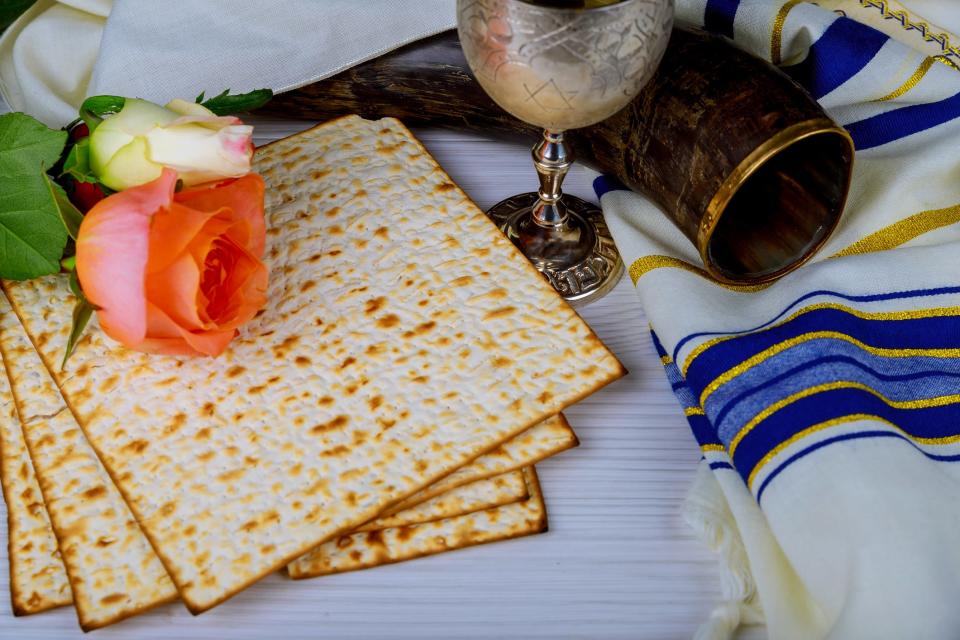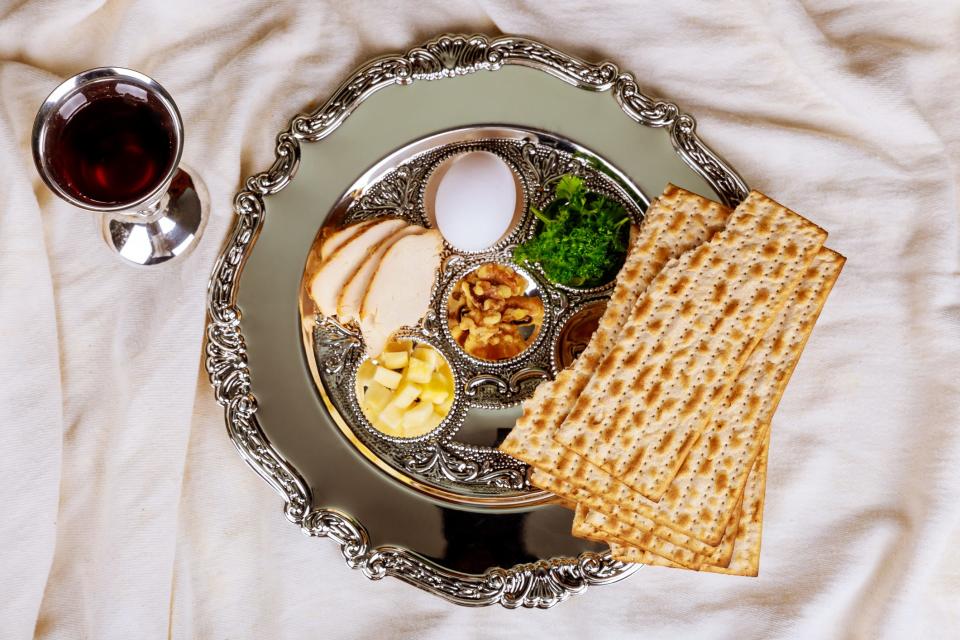Orthodox Jews prepare for a new kind of Passover in the age of COVID-19

NEPTUNE, N.J. – Food? Check. Dinnerware? Check. Got rid of all the leavened bread? Check.
Hosting Passover for an Orthodox Jewish family takes a lot of work. "I wasn't always so happy to make my own holiday," said Toms River, N.J. resident Penina Nussbaum.
Food needs to be bought. There must be a complete set of dinnerware – plates, silverware and glassware – that has never come in contact with chametz, or leavened bread. And that bread needs to be disposed of – usually in a public ritual.
But Nussbaum learned to love the process. Both sets of grandparents visit the family at some point during the holiday. And with each passing year, Nussbaum’s twin girls have started to understand the holiday more.
Opinion: The Passover story has new relevance in the age of coronavirus

And then the coronavirus struck. Orthodox Jewish rabbis turned the holiday on its head, ordering travel to be canceled and limiting the usually large Passover meals to immediate family only.
While others scrambled to figure out how to host Passover, Nussbaum remained calm. She had a head start.
“There’s just a lot of things to buy, and a lot of young families have never done it before,” Nussbaum said. “They’re scrambling to get everything done quickly. It takes a lot of time and costs a bunch of money.
“I hope everyone has what they need, but I’m just thankful I didn’t have that rush.”
How to Passover in quarantine: Everything you need to know about hosting a (virtual) seder
After religious leaders upended the way Passover is usually celebrated in order to curb the spread of the virus, many in the Orthodox Jewish community in and around Lakewood are preparing to celebrate the holiday like never before.
As the coronavirus began to spread in New Jersey a few weeks ago, a coalition of Orthodox Jewish leadership groups, including the Lakewood Vaad, Agudath Israel and the Orthodox Union, declared the epidemic a "mortal threat" and issued a statement that "upended" the holiday.
"We made an unequivocal statement to stay at home. Do not travel. Do not go to your neighbor. Don't go to your brother," Rabbi Aaron Kotler, president of Yeshiva Beth Medrash Govoha in Lakewood, said in a Facebook Live conversation with the Asbury Park Press. "We know, for the last 20 years, you've been observing Passover as a family. But do not leave your home for the Passover holiday."

The public burning of leavened bread, usually held the day before Passover begins, was canceled. Synagogues were ordered closed, replaced by home prayer. Orthodox Jews were ordered to stay home – period. Trips to visit family in other towns or states would be canceled. All Passover shopping was encouraged to be completed online or via curbside pickup.
And the traditional Passover Seder meals were ordered restricted to immediate family living within the same house, according to the Orthodox Jewish groups.
Anyone without a place to go was ordered to self-quarantine for two weeks before the holiday began and before attending anyone else's Seder meal.
"I think we all had to do an about-face," said Toms River resident Tova Herskovitz, who usually visits family in Passaic County or New York. "This year, everyone's just staying home. Usually Lakewood would be a lot emptier."
Passover: Ben Platt, Idina Menzel, Andy Cohen and Billy Porter are streaming a 'Saturday Night Seder
Instead of hosting large gatherings – or being a guest at one hosted by someone else – families are figuring out how to host their own Passover meals for their immediate families, many for the first time.
They canceled their travel plans, to parents and grandparents and in-laws' houses in other states. The long tables, designed for as many as two dozen extended family members and friends, will instead be used by only a few.
The Seder meals at Herskovitz’s parents’ house usually involve 25 people, but it goes well beyond her own family. Her father is a rabbi and routinely invites as many as 10 guests unrelated to the family for the meal – “whoever needs a place at a Seder,” Herskovitz said.
“But it’s going to be very, very toned down this year,” she said. “No one’s allowed to have guests. I think it’s going to be hard. My father feels responsibility for his congregation – but he’s not inviting everyone.”

Passover, or Pesach, is one of the major holidays on the Jewish calendar, beginning Wednesday at sundown. It celebrates the exodus of the Jewish people from slavery in Egypt. The holiday lasts eight days and, depending on the sect of Judaism, two traditional Seder meals on the first and/or second night.
The meals are simultaneously ceremonial and celebratory. In any other year, they could include 25 or 30 family members – across multiple generations – and friends.
During the meal, the story of the exodus is read from the Haggadah, a Jewish text, and a series of rituals and traditions are followed, including drinking four cups of wine at specific stages during the reading. Children are encouraged to participate in the Seder, often beginning with the question "Why is this night different from all other nights?"
Seder on Zoom? Passover traditions change as the coronavirus spreads
"At its core, the Passover Seder is designed as a family event, with an obligation by the elders of the family to explain the meaning of the various Seder rituals to the children and expound on their significance," Orthodox Union executive vice presidents Allen Fagin and Rabbi Moshe Hauer explained in a USA TODAY NETWORK column.
Nussbaum, the mother of twins, is embracing the idea of a small, tight-knit Passover. A teacher turned editor, she thinks the holiday has the potential of a "really nice bonding experience," with kids helping in the kitchen and learning more about what goes into Passover – beyond just the Seder.
"Passover is a time of redemption and salvation. That's what we remember from 3,000 years ago," she said. "I believe this time of year has that spiritual potential, as well. I'm believing – and hoping – this Passover will bring a lot of miracles and happiness."
Follow Mike Davis on Twitter: @byMikeDavis
This article originally appeared on Asbury Park Press: Coronavirus: Orthodox Jews prepare for a new kind Passover

